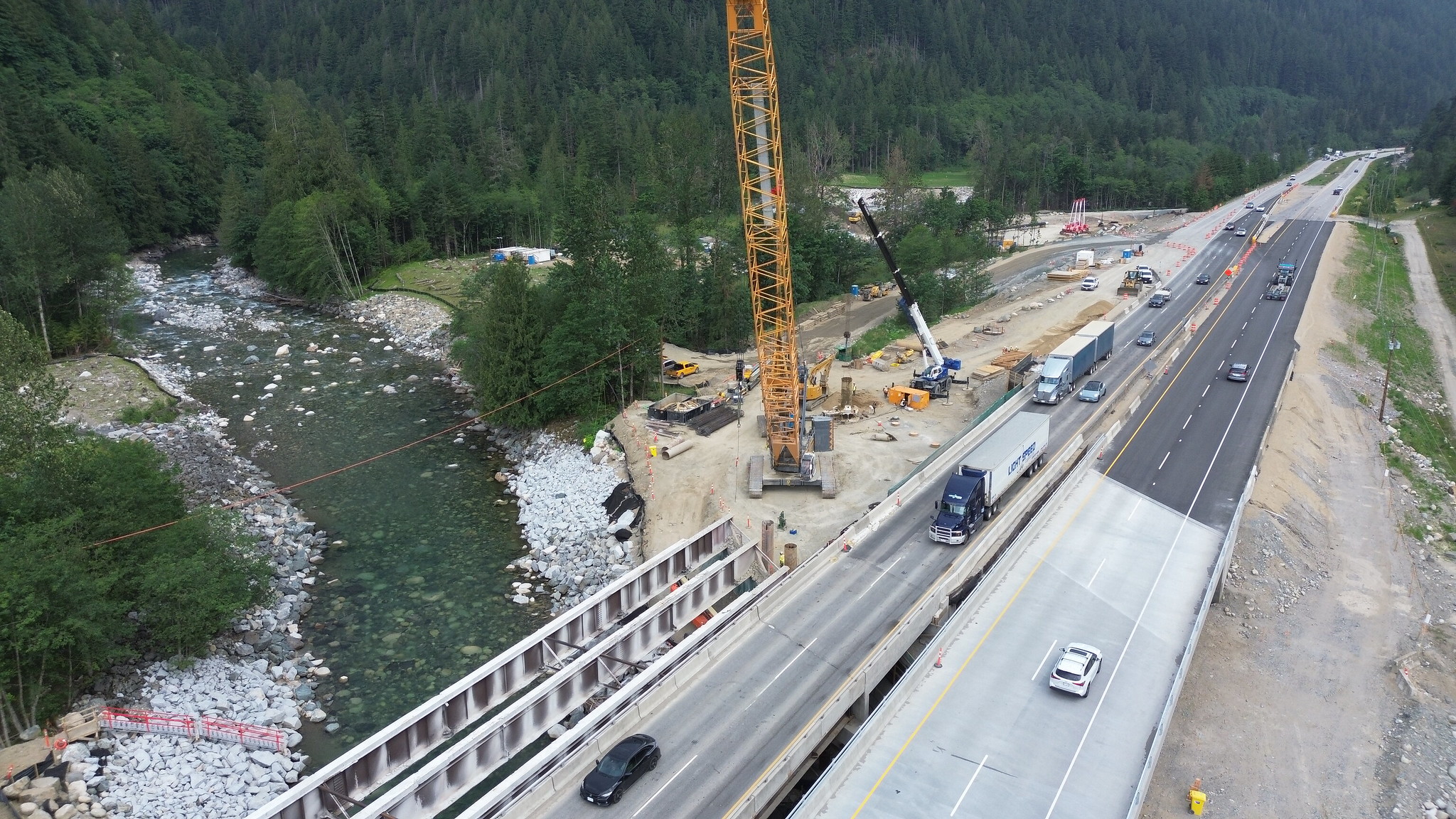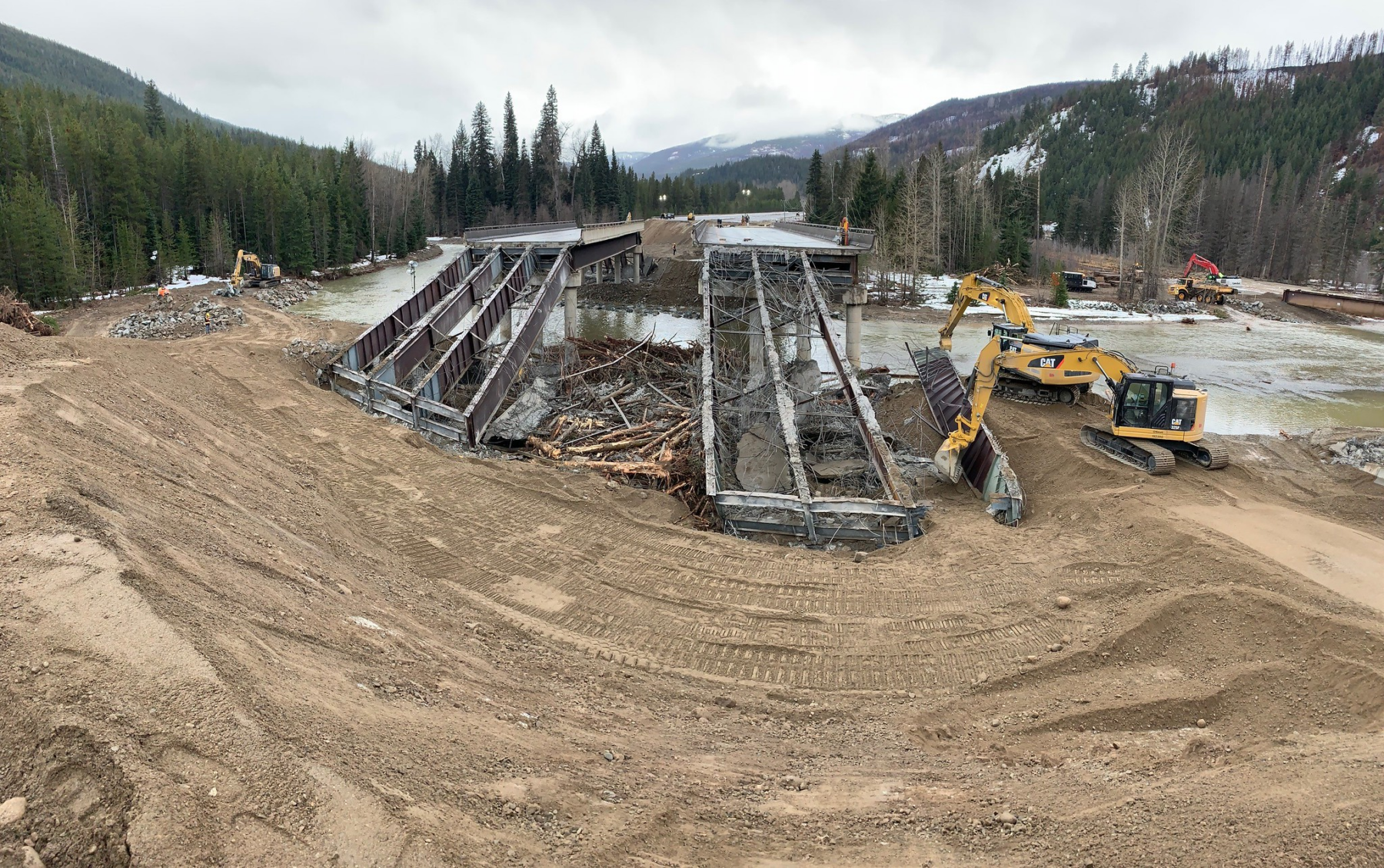Rebuilding stronger: B.C. completes Coquihalla repairs
Structures are being designed to better withstand extreme weather events.

Crews work on Jessica Bridge on Highway 5 in B.C. – BC Ministry of Transportation
Two years following a catastrophic atmospheric river, B.C.’s transportation network is coming back stronger.
On the two-year anniversary of the disaster, B.C. officials announced that permanent repairs to Coquihalla Highway 5 are complete after flooding washed it out.
The repaired highway features six new climate-resilient bridges built in place of the ones that were lost in November 2021. The six bridge spans located at three different locations have been rebuilt to handle extreme weather.
The new permanent bridges are now finished at Bottletop Bridge, 50 kilometres south of Merritt, and Jessica Bridge, 20 kilometres north of Hope. The bridges at Juliet, 53 kilometres south of Merritt, were completed earlier this year.
Reflecting on disaster
The BC Road Builders and Heavy Construction Association (BCRB&HCA) reflected on the atmospheric river and the spotlight it put on the construction sector.
“Our member companies rose to the challenge despite an incredible set of circumstances, and pulled off the unthinkable given the scope of repairs,” said Kelly Scott, president, BCRB&HCA. “This success story is a showcase for our members’ fortitude and dedication, as well as a reminder of the benefits displayed by strong partnerships.”
Coquihalla Highway 5 was closed to regular vehicle traffic on Nov. 14, 2021, due to damage caused by an atmospheric river. The rain caused flooding and washouts between Hope and Merritt. More than 20 sites spanning 130 kilometres were damaged. This included six bridges where spans completely collapsed or were damaged.
More than 300 workers used 200 pieces of equipment and moved more than 400,000 cubic metres of gravel, rock and other material to repair and reopen Highway 5 to commercial vehicle traffic in 35 days, on Dec. 20, 2021, and to all traffic on Jan. 19, 2022.
Adapting to climate change
Scott added that the damage the weather did to the province underscores the challenges the region faces and the necessity of resilient infrastructure,
“The impact of climate change on infrastructure in British Columbia in recent years has been profound,” said Scott. “It’s demonstrated that now is the time to invest in climate resilient transportation infrastructure throughout B.C., to meet our needs today and prepare for what the future holds. That’s why programs like The RoadShow will be critical, so that we fill key roles that maintain the infrastructure that is the backbone of this province.”

The road building community and others instrumental in the rebuild effort were highlighted by the province in its announcement.
“Today, we are honouring the efforts of British Columbians who worked to rebuild after the atmospheric river event, two years ago,” said Rob Fleming, minister of transportation and infrastructure. “Thank you to the Nlaka’pamux communities, Silyx Nation, Peters First Nation and Yale First Nation along with their monitors, for their support through the washout and rebuild process; and to the many contractors, unions, ministry and road-maintenance staff who worked to rebuild this piece of highway that is so important to the movement of goods in our province.”
Rebuilding with resilience
The new bridges are built to withstand high water levels by using deep-pile footings and longer spans. Large rock protection has been added to protect the bridges from erosion and scour. Trees, shrubs and grasses have been planted to encourage stream-side re-vegetation and support overall restoration of aquatic and land habitat.
KEA5, a joint venture between Kiewit Infrastructure British Columbia and Emil Anderson Construction, completed the bridges two months ahead of schedule.

Officials added that repairs to highways damaged in the floods are progressing well across southwestern B.C. In addition to the completion of the full rebuild of Highway 5, two of the three bridge replacements on Highway 1 are underway at Nicomen and Falls Creek. Design of the third bridge replacement at Tank hill is underway with construction expected to start next year. The ministry is working with local First Nation communities to fully re-build Highway 8 between Merritt and Spences Bridge. On Vancouver Island, permanent repairs are complete at the Tunnel Hill section of the Malahat that was washed out by flooding.

